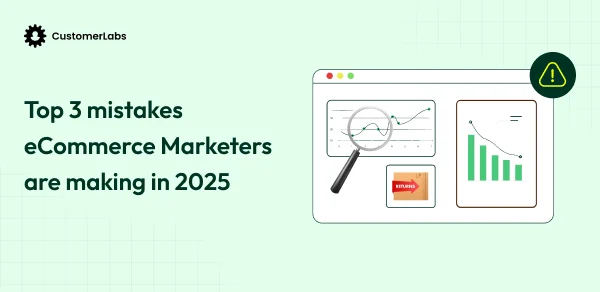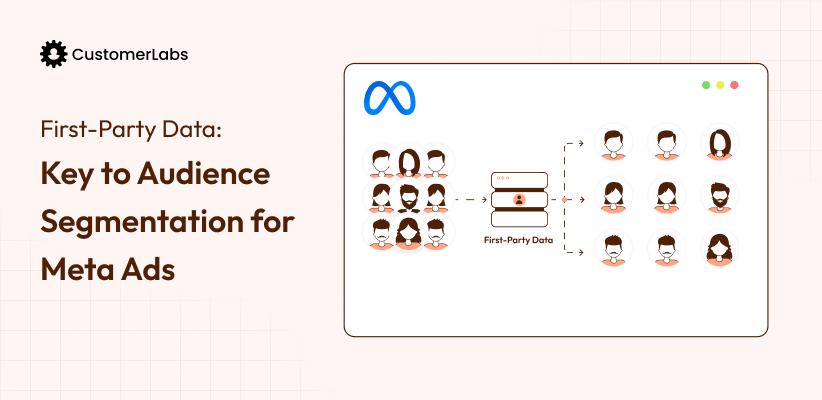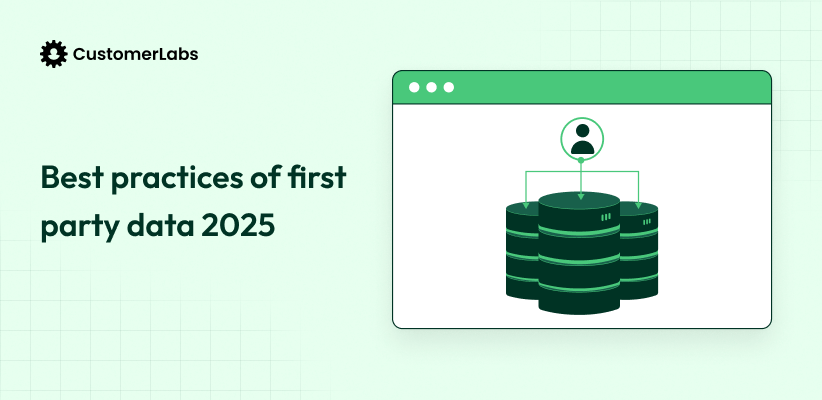Did you know that 80% of customers are more likely to engage with brands that offer personalized experiences? Yet, many businesses still struggle to gather the right data to fuel these personalized connections. As digital marketing becomes increasingly data-driven, relying on accurate and relevant data is no longer a luxury—it’s a necessity.
First-party data offers valuable insights into consumer behavior while ensuring compliance with privacy regulations like GDPR. In a world where third-party cookies are being phased out, businesses that implement a solid first-party data strategy are not just surviving—they’re thriving.
If you’re looking to stay ahead of the competition and deliver the personalized experiences your customers crave, it’s time to prioritize first-party data. In this guide, we will explore how to build and implement a robust first-party data strategy while staying aligned with emerging trends and privacy laws.
What is First-Party Data and Why Does it Matter?
First-party data is the information a business collects directly from its customers or users. This data is gathered through various channels like websites, apps, social media interactions, email sign-ups, purchases, and more. Because this data is collected directly from the source, it tends to be the most accurate and relevant.
The reason first-party data matters so much, especially now, is that it helps businesses create more personalized customer experiences. With data privacy laws tightening and third-party cookies being phased out, first-party data becomes essential for staying compliant and keeping your marketing efforts effective.
As we move forward, let’s compare first-party data with second-party and third-party data to understand why it holds a distinct advantage in today’s privacy-conscious landscape.
First-Party Data vs. Second-Party vs. Third-Party Data
To fully understand the importance of first-party data, it’s helpful to compare it with second-party and third-party data:
| Aspect | First-Party Data | Second-Party Data | Third-Party Data |
| Definition | Data collected directly from your customers through interactions on your website, apps, or other owned platforms. | Data collected by another organization but shared directly with you, often through partnerships. | Data collected by external organizations that sell it to businesses. |
| Source | Your own customers (website, surveys, CRM, etc.) | A trusted partner or another business | Aggregated data from various sources (public records, websites, etc.) |
| Accuracy | High accuracy and relevance since it’s directly from the source (your customers). | Moderately accurate as it’s shared from a trusted partner but not collected directly. | Low accuracy, as the data is aggregated and may not always be specific to your audience. |
| Data Ownership | You own and control the data. | The partner owns the data but shares it with you. | The third-party vendor owns the data, and you typically buy access. |
| Privacy and Compliance | Best for privacy compliance (GDPR, CCPA) as you control data collection practices. | More complex: depends on the terms of the partnership, but still manageable. | Riskier in terms of privacy, as third-party data collection practices might not align with your standards. |
| Examples | Website visits, customer purchases, loyalty programs, email sign-ups. | Data shared by a strategic partner, like a co-branded marketing effort or affiliate marketing data. | Data from data brokers, social media platforms, or public databases. |
| Cost | Free (you own the data). | Shared or negotiated cost with the partner. | Can be expensive depending on the provider and the volume of data. |
| Use Case | Personalization, customer segmentation, retargeting. | Expanding customer base through shared audience insights. | Broad audience targeting and market research. |
Relying on first-party data has distinct advantages. It is specific to your audience and much more likely to align with your business’s unique goals and customer needs. For businesses like CustomerLabs, first-party data is a cornerstone, helping them create personalized recommendations and improve user engagement based on their direct interactions with the platform.
The next step in implementing an effective first-party data strategy is ensuring privacy compliance, which is more critical than ever.
Impact of Privacy Regulations and the Phase-Out of Third-Party Cookies
The digital landscape is changing, and so is the way companies collect and use data. Privacy regulations such as GDPR (General Data Protection Regulation) and CCPA (California Consumer Privacy Act) enforce stricter controls on how businesses collect and use personal data. Third-party cookies are being phased out, and businesses can no longer rely on tracking technologies that gather user data across the web without consent.
This is where first-party data becomes essential. Since first-party data is gathered directly from users with their consent, it offers a more secure and compliant alternative to third-party data.
Companies that focus on building a solid first-party data strategy can continue to gain valuable insights while adhering to new privacy standards, ensuring that user trust and regulatory compliance are maintained.
Now that we understand the importance of privacy compliance, the next step is to build a robust first-party data strategy by setting clear objectives and goals.
Key Steps to Implementing a First-Party Data Strategy
To successfully build and implement a first-party data strategy, businesses need to follow a structured approach that ensures data is collected, managed, and utilized effectively. Here are the key steps to guide you through the process.
1. Define Your Goals
A first-party data strategy can drive various business and marketing outcomes. Start by defining clear, measurable objectives that align with your company’s overall goals. These could include increasing average order value, enhancing customer service, or improving conversion rates. Prioritize key use cases to begin with and gradually expand as you see success.
2. Determine How You’ll Measure Success
Customer data from first-party sources is proven to be more effective than third-party cookies for advertising. To track ROI on your first-party data efforts, focus on metrics like customer lifetime value, repeat purchase rates, and churn risk. You may also need a technology partner with advanced analytics capabilities to measure and track your success.
3. Prioritize User Trust With a Clear Value Exchange
For a successful first-party data strategy, it’s important that customers feel comfortable sharing their data with you. Set clear privacy policies that are easy to understand and ensure robust internal governance to prevent misuse.
Be transparent about the benefits customers will receive in exchange for their data, such as personalized offers or better customer service. This builds trust and encourages more customers to share their data.
4. Gather Data Across Your Enterprise
To build a complete customer profile, collect data from all parts of your business. Identify any data silos and work to unify customer information across systems. This requires collaboration with stakeholders beyond marketing, ensuring everyone has access to the right data. A unified data set can drive additional use cases, such as improving product development and optimizing supply chains.
5. Ask Customers to Share Data
Asking customers for updates, such as their mailing address, can often lead to frustration or disengagement. Instead of repeatedly requesting information, focus on confirming key details that enrich customer profiles.
Use existing interactions, like purchases or surveys, to collect relevant data without disrupting the customer experience. This exchange of value—personalized experiences in return for data—strengthens customer trust and encourages data sharing.
6. Create a Detailed Customer Journey Map
Understanding your customers’ paths from awareness to conversion is essential for effective data collection. By mapping the customer journey, you can identify key touchpoints where data can be gathered to improve segmentation and personalization. This helps you engage customers more effectively across all stages of the buying process.
7. Invest in the Right Data Platform
To implement your strategy effectively, invest in a robust data platform that helps manage, integrate, and protect your first-party data. A data collaboration platform allows you to centralize data from across the business, create consistent identifiers for customers, and drive insights that inform business decisions. With the right platform, your data strategy will help build a data-driven organization that prioritizes privacy and drives growth.
By defining clear goals, prioritizing user trust, and leveraging the right data tools, you can successfully implement a first-party data strategy that drives long-term business growth and enhances customer relationships.
As you build your first-party data strategy, it’s equally important to focus on how you foster trust and transparency with your customers, ensuring they feel valued and secure throughout their data-sharing journey.
Building Trust and Transparency with Customers
Transparency is essential when handling data. Here’s how businesses can maintain trust:
1. Transparency and Consent in Data Collection
Make sure users know what data you’re collecting and how it will be used. This transparency builds trust and encourages them to share data willingly.
2. Creating Direct Relationships Through Value Exchange
Offer something valuable in return for the data you collect. Whether it’s access to exclusive content, discounts, or personalized experiences, customers are more likely to share their data if they see a clear benefit.
3. Utilizing Consent Management Platforms (CMPs)
A CMP allows users to control what data they share and how it’s used. CustomerLabs integrates a CMP to give users a seamless experience where they can manage their preferences, ensuring compliance with regulations while maintaining transparency.
As we move forward, let’s look at how you can leverage first-party data for personalization—a major advantage of building trust through data transparency.
Using First-Party Data for Personalization
Personalization is one of the biggest advantages of first-party data. By understanding your customers’ preferences and behaviors, you can deliver tailored experiences that resonate more deeply with them.
Personalized Web and Mobile Experiences
With first-party data, you can create personalized content, product recommendations, and offers across your website and mobile app. This type of personalization increases customer satisfaction and encourages repeat visits.
Dynamic Content and Product Recommendations
By analyzing first-party data, businesses can dynamically adjust content and product recommendations based on real-time user behavior. Whether you’re recommending courses, job opportunities, or relevant articles, the ability to personalize offerings based on individual needs is a significant advantage.
Successful Personalized Marketing Campaigns
Companies like Amazon and Netflix are examples of how successful use of first-party data can lead to highly personalized experiences. These companies analyze user preferences and behaviors to deliver tailored recommendations, increasing both user engagement and conversion rates.
Now that you’ve seen how first-party data can boost personalization, let’s shift gears and talk about how to measure and fine-tune your strategy to make sure you’re getting the best results.
Measuring and Optimizing Your First-Party Data Strategy
Finally, to ensure the success of your first-party data strategy, it’s important to track key performance indicators (KPIs) and continuously optimize your approach.
1. Set Clear KPIs and Metrics
Track metrics like user engagement, conversion rates, and customer retention to see how well your data strategy is working. CustomerLabs may track the effectiveness of personalized job recommendations or how many users return to use the platform after their initial experience.
2. Continuous Optimization
Keep refining your strategy based on feedback and data. A/B testing, for instance, can help you understand what types of content, recommendations, or communications resonate best with your audience.
3. Utilizing Predictive Analytics for Insights
Use tools like CustomerLabs to analyze trends and predict user behavior. This data can help forecast future needs, ensuring that you’re always a step ahead in delivering personalized experiences.
Tools and Technologies for Data Management
To effectively manage first-party data, businesses need the right tools and technologies. Here are some of the essential tools for data management:
1. First Party Data Ops Platforms (1PD Ops)
A First Party Data Ops Platform (1PD Ops) unifies all your data sources into a single profile for each customer. This makes it easy to track interactions, segment users, and deliver personalized experiences based on real-time data. CustomerLabs 1PD Ops, a powerful solution, helps businesses consolidate customer data from various touchpoints and transform it into actionable insights, making it easier to create tailored marketing strategies and improve customer engagement.
2. Data Standardization and Integration Challenges
Integrating data from multiple sources can be tricky, but it’s essential for ensuring that your data is accurate and actionable. Using a data management system ensures all customer data is standardized and easy to use, helping to provide seamless experiences across channels.
3. Recommended Software Solutions
In addition to First Party Data Ops Platform (1PD Ops), businesses should invest in software like CRM systems, marketing automation tools, and data analytics platforms. These tools help centralize, manage, and analyze first-party data, driving more personalized and effective marketing campaigns.
As we focus on data management, security becomes paramount. Let’s now explore best practices to ensure data privacy and security in the age of increasing cybersecurity concerns.
Best Practices for Data Security and Privacy
With increasing concerns around data security, protecting customer data is paramount. Here are some best practices to ensure data privacy and security:
- Adhering to Data Protection Regulations: Always comply with GDPR, CCPA, and other data protection laws. Use encrypted connections and make sure users have control over what data they share.
- Implementing Strong Encryption and Access Controls: Use encryption to protect sensitive customer data during storage and transmission. Implement strong access controls to limit who can view or modify customer information.
- Conducting Regular Audits and System Checks: Conduct regular audits to identify potential vulnerabilities and maintain system security. Ensure that users have control over their data, allowing them to manage what they share.
- Employee Training on Data Security: Train employees on data security best practices to reduce human error and internal risks.
- Regular Security Software Updates: Regularly update security software to protect against new threats and vulnerabilities.
Conclusion
In an increasingly data-driven world, businesses must evolve by focusing on first-party data. This data provides valuable insights into customer preferences and behaviors, ensures compliance with privacy regulations and builds stronger, more transparent relationships with your audience.
By following the steps outlined in this guide—defining clear objectives, ensuring data privacy and compliance, leveraging personalization, and adopting the right technologies—you can craft a robust, future-proof first-party data strategy that drives better outcomes for your business.
As third-party data becomes less reliable and more restricted, first-party data emerges as a sustainable and ethical solution for enhancing customer engagement. Whether you’re building a more personalized website experience or improving your marketing campaigns, first-party data is the key to delivering value, ensuring privacy, and building trust with your customers.
With the right tools and strategy in place, like those offered by CustomerLabs, businesses can unlock the full potential of first-party data. By centralizing customer data and utilizing analytics for personalized experiences, you can drive long-term success and create meaningful connections with your audience.
Start your free trial today and unlock the power of first-party data to elevate your customer relationships!







